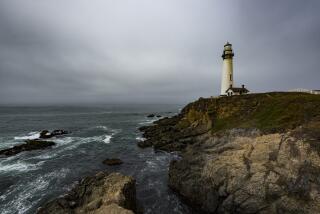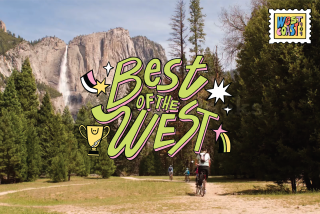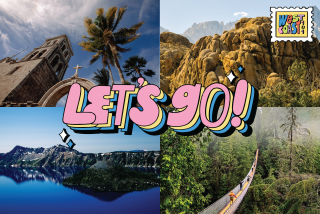The Sawtooth, a biped’s paradise
Stanley, Idaho
Like any proper ranch, Idaho Rocky Mountain Ranch keeps horses, but this place, in the heart of central Idaho’s immense Sawtooth National Recreation Area, is also a haven for two-footed creatures. My wife, Sandy, and I, both avid hikers, spent a week here, mostly on our own two feet, exploring the trails of an area that’s less frequented than the big national parks.
We did succumb to the equine allure one evening, climbing aboard a wagon drawn by Belgian draft horses that hauled us over sagebrush foothills to a sunset cookout. A starry sky twinkled romantically, and, true to our best-foot-forward philosophy, we hoofed it back to our cozy log cabin in this sprawling mountain wilderness.
More than 40 jagged 10,000-foot peaks resembling Wyoming’s Grand Tetons rise abruptly from the valley floor of this U.S. Forest Service preserve, and 300 glacially carved lakes dot the steep slopes through which 750 miles of trails thread their way. As a veteran hiker, I rank the Sawtooth as one of America’s great outdoor playgrounds.
We certainly came to play, although we didn’t plan to scale those awesome summits. We are city dwellers and, frankly, semi-softies, despite our accumulated trail miles. The snow-tipped peaks, called the Sawtooth Range, provided the majestic backdrop for our outings. Mostly we trekked less challenging paths, content to make a sparkling alpine lake or a sun-drenched meadow our modest goal.
No matter. After each hike, we returned to our cabin on the 1,000-acre Idaho Rocky Mountain Ranch as exhilarated as if we had topped Everest. Our reward: a soothing soak in the outdoor hot spring pool. Later we sipped wine on the lodge’s big front porch, listened to a cowboy singer and watched the orange sun disappear behind the mountains. This is our style of hiking.
Donning sturdy boots, we plunged into the wilds toting a trail mix lunch and plenty of water. We could hardly resist this surprisingly untamed land. Dusty little Stanley (population 70 or so), nine miles north of the ranch, is the biggest town within 50 miles. Trout streams fed by summer snowmelt cascade through meadows thick with wildflowers. The famed Salmon River gets its start here. From the Salmon’s slender valley, where the ranch sits, or high above on a mountain trail the wide-open spaces seem limitless.
Civilization in the wilderness
As early as 1911, the distinctive Sawtooth Range — the peaks really do look like the sharp teeth of a saw — was considered for national park status. That estimable idea failed because of local opposition, but perhaps the next best alternative was achieved. In 1972, 754,000 acres were designated a Forest Service recreation area, which means some commercial uses are permitted. About a third is officially classified as wilderness, open only to hikers, backpackers and horseback riders.Idaho Rocky Mountain Ranch is the Sawtooth region’s most appealing lodging. A dozen years ago we spent another week here. We hoped nothing had changed, and it hadn’t. The main lodge building, an artwork in log architecture, looked just as we remembered it. Stanley’s main street, Ace of Diamonds, remained unpaved. The only evidence of urbanism I detected was sleek Meadow Creek Spa, which features resort-style body wraps, hot stone treatments and aromatherapy massages.
The ranch’s pine lodge (four rooms) and the cabins (eight duplex, one single) were completed in 1930. During construction, logs for the lodge and cabins were cut on the property, and a crew of 60 camped on site, including a mason, who crafted floor-to-ceiling stone fireplaces, and a blacksmith who forged door latches and other wrought-iron trim. The original log and hickory furniture and porch rockers still adorn the place, which began life as a private club. “What you see now,” a brochure says, “is what was here from the first.”
In 1977 it began welcoming dudes. For us city folks coming to the country, it’s a nice blend of elegant and rustic, wonderfully apt for the ranch’s majestic setting. It is listed on the National Register of Historic Places as an early example of Idaho’s guest ranch industry.
Our cabin (No. 14), tucked beneath shady pines, had two comfortable hickory chairs (one rocker, one armchair), a large dressing room with plenty of storage and a stone shower in the bathroom. A handmade quilt covered the bed, and wood was stacked high alongside the fireplace. Even in summer, overnight temperatures can drop into the low 30s, so the fireplaces come in handy. A fire blazed daily at breakfast in the lodge dining room.
This is a ranch for independent folks. Almost any outdoor activity you want is readily available, usually without the summer throngs. Take your pick: mountain climbing, mountain biking, kayaking, fishing, sailing, trail riding, swimming, white-water rafting, sailboarding, water skiing on two of five lakes accessible by motor vehicle, bird-watching and wildlife spotting.
The staff, mostly college kids on summer break, will help you choose a trail; at the registration desk we picked up a free guide to “Day Hikes Within the Sawtooth NRA.” Or they can direct you to rafting and riding outfitters. Otherwise we were on our own.
Breakfast and dinner are included with the room. A hearty bacon-and-eggs breakfast (with fruit and cereal options) is served from 7:30 to 10 a.m., so there’s no need to rush in the morning. (A bag lunch is available for a small fee.) Dinner is 6:30 to 8:30 p.m., a surprisingly good four-course affair that featured soup, salad, a choice of three entrees (meat, fish, pasta) and dessert.
One night I chose the grilled steak, which was excellent. My favorite entree was medallions of pork loin stuffed with dried tomatoes and served with sautéed squash and red potatoes. That night nobody passed up the lemon meringue pie.
Most guests are seated at communal tables, though a few tables for couples can be reserved. The big tables gave the evening a festive dinner party ambience, and our dinner partners proved interesting. We chatted with a retired commercial airline pilot from Reno, a saddle maker from Boise, a lobbyist from our hometown of Washington, D.C., an athletic young couple (they hiked the tough stuff) from Manhattan and a lawyer from the Outer Banks of North Carolina.
Some guests topped the evening with a starlight soak in the hot spring pool. Sandy relished the time to read in our cabin while I plotted our next day’s hike.
Our toughest trail was the first one we took, a four-mile round trip to Fourth of July Lake. The ascent didn’t trouble us; it was the altitude. We live at sea level; the ranch sits at about 6,400 feet. To reach the trail head, we drove 10 miles on a rough dirt road, not realizing it was climbing to about 8,500 feet. The lake itself, we later learned, is nestled at 9,365 feet. No wonder we puffed.
We slogged along a path that snaked through scattered woods and meadows splashed with blue lupine. Balancing delicately — and knowing a slip would soak us — we crossed two small streams on hewn logs. The calendar said July 1, but snow, knee-deep in spots, still covered short stretches of the trail near the lake. The sun beamed hot, but a breeze kept us cool. Getting to the top proved a workout; this was why we had come to Sawtooth country.
Alpine lake vistas
Our favorite trail was a 5 1/2-mile (round trip) trek that climbs over a rocky ridge from Pettit Lake to Yellowbelly Lake. For much of the way it yields magnificent views of Pettit Lake. And we could swim (brrrr!) or soak tired feet (ahhh!) on a sandy beach at either lake.Between hikes, we did manage some sightseeing. At the urging of dinner partners, we arose early to see chinook salmon at the Sawtooth Fish Hatchery, about six miles south of Stanley on Idaho 75. Each summer, oceangoing chinook return to their birthplace in the headwaters of the Salmon River to spawn. It’s a tortuous 900-mile journey from the Pacific, where they have matured for three years.
At the hatchery, they are temporarily trapped. At 9 each morning, a three-person hatchery team scoops the latest arrivals out of a holding pool one by one. Each is briefly anesthetized and given an antimicrobe injection, measured and sent on its way. This is done to help boost the much-depleted chinook numbers, resulting from dams that hinder their passage. But the salmon — 20- to 40-pounders — don’t see it this way. When the net hoists them from the pool, they put up a vigorous fight. It’s a great lesson in ecology.
One afternoon we took the 25-mile drive from Stanley to Custer, a ghost town on the Yankee Fork River. From 1881 to 1904, more than $12 million in gold and silver was pulled from the surrounding mountains. Today half a dozen buildings maintained by the folksy Custer Museum still stand on what was once Custer’s main street. We picked up a free brochure for a walking tour into the past.
Another day, we made a quick foray 50 miles south to the famed ski resorts of Ketchum and Sun Valley to browse the upscale boutiques. But we quickly tired of the congestion and hurried back to empty Sawtooth byways.
Mostly, though, we hiked and soaked and sipped, always with the Sawtooth Range in sight to captivate our eyes and refresh our spirits. We are hikers, and this is why.
*
(BEGIN TEXT OF INFOBOX)
Sinking your teeth into Sawtooth
GETTING THERE:
From LAX, nonstop service is available on Alaska, direct service (stop, no change of planes) on Southwest and connecting service (change of planes) on Delta, United and Southwest. Restricted round-trip fares begin at $198.
From Boise, take Idaho 21, the Ponderosa Pine Scenic Byway, to Stanley, about 130 mostly slow, mountainous miles. From Stanley, take Idaho 75, the Sawtooth Scenic Byway, about nine miles south to Idaho Rocky Mountain Ranch. The entrance is on the left, marked by a ranch-style gateway.
WHERE TO STAY:
Idaho Rocky Mountain Ranch, HC 64, Box 9934, Stanley, ID 83278; (208) 774-3544, fax (208) 774-3477, https://www.idahorocky.com . Open mid-June to mid-September. Cabins range from $109 to $127 per night per person, depending on length of stay. The rate includes breakfast and dinner. An additional 15% service charge and taxes of 8% are charged. Lodge rooms begin at $92 per person, per night, again depending on length of stay.
Redfish Lake Lodge, P.O. Box 9, Stanley, ID 83278; (208) 774-3536, fax (208) 774-3546, https://www.redfishlake.com . A 42-room cabin and lodge resort on Redfish Lake, about six miles south of Stanley. Open late May to late September. Rates begin at $62 (lodge room with communal bath) a night, double.
Mountain Village Resort, P.O. Box 150, Stanley, ID 83278; (800) 843-5475 or (208) 774-3661, fax (208) 774-3761, https://www.mountainvillage.com . An attractive 60-room lodge-style motel in Stanley. In summer, $79 a night, double.
Riverside Motel, P.O. Box 192, Stanley, ID 83278; (800) 284-3185 or (208) 774-3409, https://www.riversidemotel.biz . A modern 14-room log cabin motel (with kitchenettes) on the Salmon River. In summer, $90 for two, $100 for a river view.
Sessions Lodge, HC 64, Box 9696, Ketchum, ID 83340; (208) 774-3366. A basic but beautifully located eight-room motel 10 miles south of Stanley near Idaho Rocky Mountain Ranch. In summer, $47 a night double.
WHERE TO EAT:
Idaho Rocky Mountain Ranch, see above. Open to six off-ranch guests, nightly except Mondays and Saturdays; $35 per person.
Redfish Lake Lodge, see above. Family dining with a lake view. Daily beef, pasta and fish specials. Dinner entrees $8-$24.
Mountain Village Restaurant, (208) 774-3317. An all-American family menu. Steaks, chops, burgers, fish. Dinner entrees $10-$17.
TO LEARN MORE:
Stanley-Sawtooth Chamber of Commerce, P.O. Box 8, Stanley, ID 83278; (800) 878-7950 or (208) 774-3411, https://www.stanleycc.org .
Redfish Lake Visitor Center, Sawtooth National Recreation Area, c/o Stanley Ranger Station, HC 64, Box 9900, Stanley, ID 83278; (208) 774-3376.
— James T. Yenckel
James T. Yenckel, a Washington, D.C., travel writer, has spent much of his adult life exploring the American West.
More to Read
Sign up for The Wild
We’ll help you find the best places to hike, bike and run, as well as the perfect silent spots for meditation and yoga.
You may occasionally receive promotional content from the Los Angeles Times.






